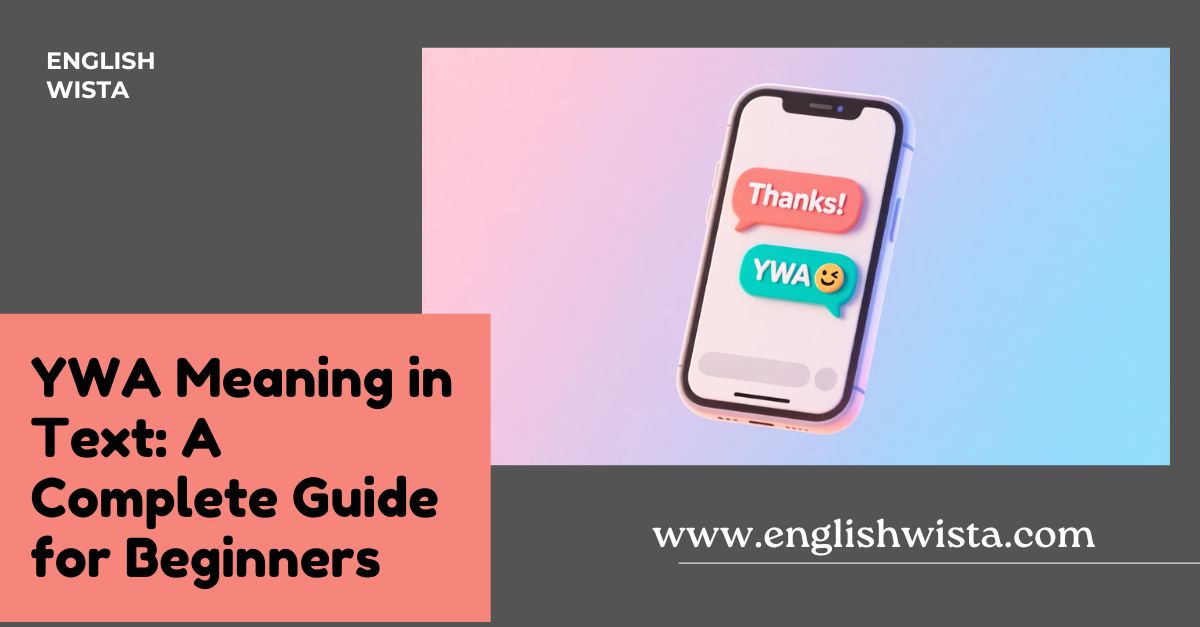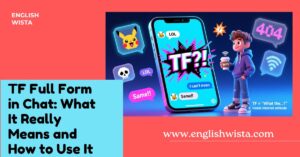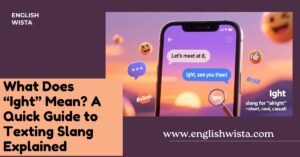If you’ve ever been in the middle of a text conversation and suddenly seen an abbreviation that made you pause, you’re not alone. Texting has its own language, full of shortcuts, acronyms, and slang that help people type faster. Instead of writing long phrases, people just use three or four letters, and everyone who knows the code instantly understands.
One such abbreviation is “YWA.” If you’ve seen this in a text and wondered, “What does that even mean?” you’ve come to the right place. In this article, we’ll break down the meaning of YWA, explain how it’s used in everyday texting, and give you plenty of examples so you’ll never be confused again.
Let’s dive in and uncover everything you need to know about YWA in text.
What Does YWA Mean in Text?
At its core, YWA stands for “You’re Welcome Anyway.”
It’s often used as a casual or slightly playful response when someone thanks you, even if they didn’t really need to. It’s less formal than just saying “you’re welcome” and sometimes carries a lighthearted or even teasing tone.
For example:
- Friend: “I didn’t really need help, but thanks for offering.”
- You: “YWA 😅”
In this case, you’re acknowledging their thanks but keeping it casual. It’s like saying, “No problem, you’re still welcome either way.”
Breaking It Down: The Simple Definition
To keep it crystal clear, here’s the definition in plain words:
YWA = You’re Welcome Anyway
It is a shorthand people use in text messages, chats, or on social media to reply when someone says thanks.
Think of it as a cousin of “YW” (you’re welcome), but with a little extra flavor that makes it feel more playful.
How Is YWA Different from YW?
Now, you might be asking, “Why not just say YW instead of YWA?” That’s a great question!
Here’s the difference:
- YW (You’re Welcome): Straightforward, polite, and neutral.
- YWA (You’re Welcome Anyway): More casual, slightly humorous, or a way to acknowledge thanks even if it wasn’t really necessary.
Example comparison:
- Friend: “Thanks for waiting for me.”
- You: “YW 😊” (polite and standard)
- Friend: “I didn’t actually need your help, but thanks for offering.”
- You: “YWA 😂” (lighthearted, casual)
So while they both mean almost the same thing, YWA adds a layer of personality.
When Do People Use YWA?
People usually use YWA in relaxed conversations. You won’t see it in formal settings, business emails, or professional chats. Instead, it’s something you’d send to a friend, sibling, or maybe in a group chat when the mood is light.
Here are some common situations where YWA might pop up:
- When someone thanks you but insists they didn’t really need to.
- Friend: “I didn’t even use your notes, but thanks.”
- You: “YWA 😏”
- When you want to be playful in your reply.
- Friend: “Thanks for reminding me, even though I already knew.”
- You: “YWA 😉”
- When you’re brushing off the formality of thanks.
- Friend: “Thanks for waiting, but I wasn’t that late.”
- You: “YWA 😂”
In short, it’s perfect for friendly conversations where humor and playfulness matter.
Is YWA the Same as “You’re Welcome Anyway” in Real Life Speech?
Good question! While YWA is mainly for texting, people sometimes say “you’re welcome anyway” in real-life conversations too. It carries the same light, casual tone.
Example in real life:
- Friend: “I didn’t even need your help with the homework.”
- You: “Well, you’re welcome anyway!”
So yes, the abbreviation reflects something people actually say out loud, though it’s less common than just saying “you’re welcome.”
Other Possible Meanings of YWA
Like many internet abbreviations, YWA doesn’t always mean just one thing. While “You’re Welcome Anyway” is the most common meaning, depending on the context, it can also stand for other phrases.
Some alternative meanings include:
- Young Women’s Association (used in organizations)
- Yeah Whatever Anyway (used in a dismissive tone)
However, in texting and casual chats, the most widely accepted meaning is still You’re Welcome Anyway.
If you ever feel unsure, look at the conversation around it. Context will almost always tell you which meaning makes sense.
Examples of YWA in Sentences
Let’s make it super practical with real-life texting examples.
- Friendly Chat
- Friend: “Thanks for reminding me about the movie, but I already had tickets.”
- You: “YWA 😆”
- Sibling Conversation
- Sibling: “I didn’t actually need you to cover for me, but thanks anyway.”
- You: “Haha YWA!”
- Group Chat
- Friend: “Thanks for waiting for me, even though I was only like 2 minutes late.”
- You: “YWA 🤷”
- Playful Teasing
- Friend: “I didn’t need help, but you jumped in anyway. Thanks though.”
- You: “YWA 😉”
These examples show how it works naturally in conversations without sounding stiff or overly formal.
Similar Abbreviations You Might See
If you understand YWA, you’ll probably run into other common abbreviations too. Let’s compare:
- YW: You’re welcome
- NP: No problem
- NBD: No big deal
- IDK: I don’t know
- BRB: Be right back
Among these, YW and NP are closest to YWA. The difference is that YWA feels more playful and less serious.
Fun Facts About Texting Language
Now that we’ve explained YWA, let’s explore a few fun things about texting slang in general:
- Abbreviations save time. Instead of typing long sentences, people shorten phrases into 2–4 letters.
- They create a sense of belonging. Using abbreviations like YWA shows you’re “in the know” and part of modern texting culture.
- They’re flexible. The same abbreviation can mean different things depending on the context. That’s why paying attention to conversation flow is key.
- They evolve quickly. Ten years ago, no one used YWA. In another ten years, we might be using something entirely new.
So when you learn YWA, you’re not just learning one word you’re stepping into the constantly changing world of internet slang.
Tips for Using YWA Correctly
Before you start using YWA in your own texts, here are a few quick tips:
- Keep it casual. Only use YWA in relaxed settings with friends, not in work or school-related messages.
- Pay attention to tone. If the conversation is serious, YWA might come across as sarcastic.
- Add emojis if needed. Emojis can help show your tone (playful, teasing, or lighthearted).
- Don’t overuse it. Like any slang, if you use it too much, it might lose its charm.
Common Misunderstandings About YWA
Some people might mistake YWA for something negative or dismissive. For example, “Yeah Whatever Anyway” has a very different vibe compared to “You’re Welcome Anyway.”
To avoid confusion:
- Use it only when “You’re Welcome Anyway” makes sense.
- If someone asks what it means, explain it simply: “It just means you’re welcome, but in a casual way.”
Why Understanding YWA Matters
At first glance, YWA might seem like just another small abbreviation. But knowing it can make your conversations smoother. Here’s why it matters:
- You won’t be confused. Next time someone sends YWA, you’ll know they’re just being playful.
- You can use it yourself. Adding it to your texting vocabulary makes your replies more fun.
- It shows awareness. Understanding texting language shows you’re up to date with modern communication.
Conclusion: Key Takeaways About YWA
We’ve explored YWA meaning in text from every angle, so let’s wrap it up with the essentials:
- YWA stands for “You’re Welcome Anyway.”
- It’s a casual, playful response when someone thanks you, even if they didn’t really need to.
- It’s different from YW (You’re Welcome) because it adds humor or lightness.
- Other meanings exist, but in texting, this is the most common one.
- Best used with friends, siblings, or in informal chats not in serious or professional situations.
So next time you see or want to use YWA, you’ll know exactly what it means and how to use it naturally. It’s just another piece of the fun puzzle that is texting language!
Now that you’ve got this down, try slipping it into a chat you might be surprised how often it fits. YWA 😉



